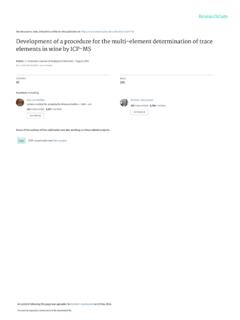Transcription of Introduction of Islamic Banking and Finance in Ghana ...
1 See discussions, stats, and author profiles for this publication at: of Islamic Banking and Finance in Ghana : opportunities andChallengesArticle January 2016 DOI: ,9112 authors:Some of the authors of this publication are also working on these related projects: Islamic Banking View projectBanking View projectJoseph MbawuniUniversity of Education, Winneba24 PUBLICATIONS 143 CITATIONS SEE PROFILES imon NimakoUniversity of Education, Winneba45 PUBLICATIONS 496 CITATIONS SEE PROFILEAll content following this page was uploaded by Joseph Mbawuni on 23 December user has requested enhancement of the downloaded of Islamic Banking and Finance June 2016, Vol. 4, No. 1, pp. 60-70 ISSN 2374-2666 (Print) 2374-2658 (Online) Copyright The Author(s). All Rights Reserved. Published by American Research Institute for Policy Development DOI: URL: Introduction of Islamic Banking and Finance in Ghana : opportunities and challenges Joseph Mbawuni (PhD)1 & Simon Gyasi Nimako (PhD Researcher)2 Abstract This paper presents a general review of opportunities and challenges of Islamic Banking and Finance (IBF) Introduction in Ghana .
2 It relies on existing literature, especially from Islamic Banking and Finance , and positional views of the authors. The paper identifies key factors in Ghana s economy that present prospects for the Introduction and adoption of IBF in Ghana by policy makers and consumers. These include opportunity for employment, democratic political system of governance, flexible industry regulatory framework, existing agrarian sectors, high demand for Banking products, high interest rate, Muslim population, and quest for sound business practices. It also discusses the potential challenges that are likely to face full-fledge IBF products and institution in Ghana in terms of IBF governance, consumer behaviour and performance of IBF institution. Finally, the paper proposes strategies for overcoming the potential challenges for the effective Introduction of IBF in Ghana . Managerially, this paper puts together a rich blend of objective appraisal of IBF from many perspectives and serves as an important source of information on IBF in Ghana for stakeholders, especially the Bank of Ghana , policy makers, and IBF practitioners.
3 Theoretically, this paper provides valuable source of literature for academics and practitioners interested in IBF research and business in Ghana Banking Industry. Keywords: Riba, sharia, corporate governance, Ghana , consumer behaviour, bank profitability 1. Introduction Islamic Banking and financing (IBF) is considered as one of the fastest growing industries in the past three decades (Wajdi Dusuki & Irwani Abdullah, 2007). IBF industry has grown to more than trillion dollars in total assets, in spite of its relatively small size compared with global Banking industry (Ernst & Young, 2012). HSBC (2012) indicates that the growth rate of IBF is over 10% annually and has the potential of increasing its total assets to USD trillion by 2020. IBF has become an innovative way of Banking which has been widely accepted and adopted in in both Islamic and non- Islamic countries (Iqbal & Molyneux, 2005).
4 IBF are fundamentally different from conventional Banking because IBF institutions principally operate on the basis of Sharia law, which prohibits the charging of interest (Hassan, Kayed, & Oseni, 2013; Hassan & Lewis, 2014). According to Karbhari, Naser and Shahin (2004), Islamic banks may function in countries adopting Islamic Sharia principles ( , Malaysia, Iran, Pakistan, and Sudan), or function in predominantly Muslim countries along with conventional banks (Arab and Muslim countries), or function in predominantly non-Muslim countries along with conventional banks (Western countries). 1 Faculty of Business Education, University of Education, Winneba, Ghana . Box 1277, Kumasi- Ghana . 2 Department of Management Studies Education, University of Education, Winneba, Box 1277, Kumasi Ghana . Phone: +233 261713782, Email: Joseph Mbawuni & Nimako 61 The rise in IBF could be attributed to many factors.
5 It has long been noted that the growth in IBF institutions is due to the rise in significant oil revenues (Ali, 1981). With growth of Middle Eastern oil exploitation, there is also huge Islamic investment and Muslim capital, estimated at $830 billion (Ali, 2010; Walsh, 2007). Also, recent developments in Middle Eastern markets have created attractive prospects for foreign companies seeking substantial investments including Banking that is in accord with Islamic principles (Usmani, 2010). While considerable empirical studies have been done in IBF by scholars and practitioners, it has been observed that, much of the literature on IBF is limited to Islam dominated or Islamic countries ( , Iqbal, Zamir & Abbas Mirakhor, 2007; Iqbal, Munawar & Philip Molyneux, 2005; Manzoor & Amanaullah, 2010; Ismail et al., 2008; Echchabi & Abdul-Aziz, 2012; Rashid et al., 2012). In this regard, Iqbal et al. (2005) observed that IBF was unheard of in non-Muslim countries, and considered a wishful thinking by those who desired to engage in Banking that was in accord with Islamic principles.
6 Few studies have examined customer perception of IBF in Sub-Saharan Africa context ( , Danjuma, Kumshe, Daneji, & Ibrahim, 2015; Jinjiri, 2014). As a result, there is very limited literature on IBF in non- Islamic countries such as Ghana (Fada & Wabekwa, 2012; Jinjiri, 2014). There is dearth of empirical research in IBF in Ghana . It is therefore academically interesting to explore the opportunity and challenges of Introduction of IBF to the economy of Ghana . This will provide scholars and practitioners with a general review of IBF based on literature and expert opinion as a guide for intellectual discourse for the successful Introduction and adoption of IBF in Ghana by stakeholders. Therefore, this paper seeks to provide a general review of IB in Ghana , with emphasis on prospects and challenges of IBF Introduction in Ghana . The rest of the paper is organized as follows: It continues with a review of literature in IBF concepts, IBF in Africa and Ghana .
7 This is followed by a discussion of the prospects and challenges of IBF in Ghana , and ends with some recommendations, conclusion, limitations, and directions for future research. 2. Literature review The nature of Islamic Banking and Finance Islamic Banking (IBF) refers to Banking and financial operations and activities that are based on Islamic principles and laws (Hassan, Kayed, & Oseni, 2013; Hassan, & Lewis, 2014). Based on Islamic law, there are four main principles that govern the activities of the Islamic banks. First, IB prohibits Riba, the taking or giving of interest, which is believed to be unequal trade of values in exchange. (Abedifar, Ebrahim, Molyneux, & Tarazi, 2015; Hassan & Lewis, 2014). Thus, it is only acceptable for profit to be earned from trade in goods and services. The prohibition of taking or giving of interest on transactions also implies the removal of debt-based financing from the economy.
8 Instead of charging of interest, IB permits profit and loss sharing (PLS) concept in which both parties agree on predetermined amounts in the business contract. Second, IBF prohibits Gharar. Gharar refers economic transactions that have absolute or excessive uncertainty or risk in business transactions (Abedifar, et al., 2015; Hassan & Lewis, 2014). Gambling, deceit or fraudulent activities are examples of activities involving uncertainties that cause great loss to one party and unreasonable profit of the other party. Thus, IBF ensures the full disclosure of information and removal of any potentially deceitful or risky information in a business contract. Third, IBF prohibits Maisir. Maisir refers to unlawful, unethical activities, sinful and socially irresponsible activities, such as bribery, prostitution, drug abuse, alcohol, sale, and consumption of pork, and gambling.
9 These bad business practices are considered forbidden behaviour (haram) to all Muslims, because they adversely affect justice and fairness in financial transactions, lead to the exploitation of one party to a contract, and are detrimental to human life, fairness, societal well-being (Hassan et al., 2013; Hassan, & Lewis, 2014). Fourth, IBF ensures that financial transactions must be directly or indirectly linked to a real economic transaction and must have real economic values to both contractual parties, and the society at large. A review of IBF literature ( Abedifar, et al., 2015; Hassan et al., 2013; Hassan, & Lewis, 2014; Nawi et al., 2013) shows that IBF products take many forms based on the Islamic Finance methods, which include (i) Mudarabah, the provision of capital in a partial equity partnership; (ii) Musharakah, full equity partnerships, (iii) Murabaha, an instrument used for financing the purchase of goods; (iv) Bai muajjall, deferred payments on products; (v) Bai Salam, advance sale contracts; (vi) Istisna, or manufacturing contracts; (vii) Ijarah, lease financing; and (viii) Quard Hassan, a system of benevolent loans.
10 62 Journal of Islamic Banking and Finance , Vol. 4(1), June 2016 Islamic Banking in Africa IBF in Africa originated from Egypt in the 1960s when the first Islamic bank in Africa was established in Egypt (Aburime & Alo, 2009; Mouawad, 2009). Since then, there has been significant growth in revenue for African IBF estimated at USD billion as of 2008 (The City UK, 2011). In spite of this promising trend, recent empirical research shows that, in Africa the IBF and Finance market remains greatly underdeveloped and scarce in many sub-African regions, representing less than 10% of commercial banks operating in 21 African countries offering Islamic financial services (Faye et al., 2013; Gelbard et al., 2015). According to Faye et al. (2013) the continent has only 116 Islamic financial service providers from 21 countries out of the 54 African countries.



















